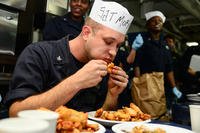Buck Henry, who made his name both as a writer and an actor, was a veteran of the U.S. Army and the son of an Air Force brigadier general. Henry died of a heart attack on Jan. 8 at the age of 89.
He began his military career as a helicopter mechanic but transferred to special services, where he co-wrote a musical comedy that toured bases to entertain troops. He took that experience as the foundation for a career that would revolutionize both television and movies over six decades.
Buck was born into a life of privilege. His general officer father was also a successful stockbroker, and his mother was silent film star Ruth Taylor. He attended high school at the elite Dalton School in New York City and the prestigious Harvard (now Harvard-Westlake) School in Los Angeles. He graduated from the Ivy League's Dartmouth College in 1952 before joining the Army.
Take a moment to consider: What's the over/under on Dalton or Harvard-Westlake alumni joining the military over the last 50 years? It's got to be a number that's close to zero. Dartmouth has an ROTC program, but it's probably safe to imagine that there are very, very few cadets who graduated prep school marching in Hanover, New Hampshire.
So, here's to an era when all strata of society participated in service to country and to the days when the Army could produce as subversive a mind as Buck Henry.
Here are seven ways that he revolutionized comedy:
1. 'Society for Indecency to Naked Animals' (SINA)
Buck's first big gig was playing animal rights activist G. Clifford Prout, who fronted a protest group that wanted animals to wear clothes. Conceived in partnership with legendary prank comic Alan Abel, the true #fakenews campaign went nationwide and Henry made dozens of television appearances, including the Today Show. The gig was up after Prout/Henry taped a segment for the CBS Evening News and staffers recognized Buck.
Henry claimed that Walter Cronkite never forgave him. For a deep dive into the SINA, listen to this interview with Abel.
2. 'Get Smart'
Buck's big break came when he joined up with fellow Army veteran Mel Brooks to create "Get Smart," a wacky situation comedy that imagined what would happen if Inspector Clouseau were an American veteran who worked as a Bond-style secret agent.
The show, which earned Henry an Emmy for writing, ran for five seasons and attracted a devoted cult following even if it never became a runaway hit. His biggest contribution to the show was the notorious "cone of silence," a joke that's crossed over to generations who have no idea where it started.
3. 'The Graduate'
Henry left the "Get Smart" after two seasons in anticipation of "The Graduate," the Mike Nichols-directed film that upended the entire movie business at the end of 1967. Hollywood was looking for Nichols (hot off an Oscar nomination and a runaway success with "Who's Afraid of Virginia Woolf?") to flop when he insisted on casting the non-traditional leading man Dustin Hoffman as Benjamin Braddock.
Henry got an Oscar nomination for his screenplay, and the movie was a massive success of the kind that's hard to imagine today. It's almost as if a modern arthouse classic like "Sorry to Bother You" turned out to be as big as "Star Wars."
"The Graduate" changed what movie leading men were allowed to look like. Over the next decade, Hoffman, Robert De Niro and Al Pacino all got huge roles that previously would've gone exclusively to Robert Redford or some slightly less talented guy who looked like him.
4. 'Catch-22'
Henry and Nichols collaborated again on "Catch-22," based on Joseph Heller's satirical World War II novel. Did they match the book's creative heights? No, but the movie holds up amazingly well 50 years later and probably plays better than it did back in 1970.
Henry made quite an impression when he played the role of Lt. Col. Korn in the movie, kicking off a long string of major movie acting roles.
5. 'Saturday Night Live'
Buck Henry's writing was a huge influence on the early days of "Saturday Night Live," and they paid tribute by asking him to host the show 10 times, making him the fourth all-time most-invited host behind Alec Baldwin, Steve Martin and John Goodman.
Henry may be most remembered for his appearances as John Belushi's foil in the "Samurai" sketches or in the pervy Uncle Roy series (which seems to have been scrubbed from the NBC website), but the Lord and Lady sketch from above may be the funniest.
6. 'Heaven Can Wait'
Buck teamed up with Warren Beatty for a rewrite/remake of the classic "Here Comes Mister Jordan," and they made a movie that both broke box office records and earned eight Oscar nominations.
"Heaven Can Wait" was up for Best Picture, and Henry was nominated with Beatty for co-directing the movie. But it was a Vietnam War year at the Oscars, with "The Deer Hunter" taking home Best Picture and "Coming Home" sweeping the lead acting categories.
Buck appears as Beatty's heavenly escort in the movie, and their chemistry suggests they should've made more movies together.
7. 'The Player'
Henry plays himself in Robert Altman's vicious 1999 Hollywood satire. The movie makes the perfect joke about movie sequel mania when we see Buck sitting in an executive's office pitching his (fake) idea for "The Graduate 2."
Henry himself wrote his lines for the movie, which holds up as the greatest modern takedown of the film business.
We've left out Buck's screenplay for Peter Bogdanovich's screwball comedy "What's Up, Doc?" (possibly the funniest movie ever made; the cult (but flop) TV series "Quark" (created with Richard Benjamin); and his hilarious performance as Liz Lemon's dad Dick on the NBC series "30 Rock."
Buck Henry was a rare individual, a rich kid who joined the Army and made America laugh for decades. Rest well, sir.
















